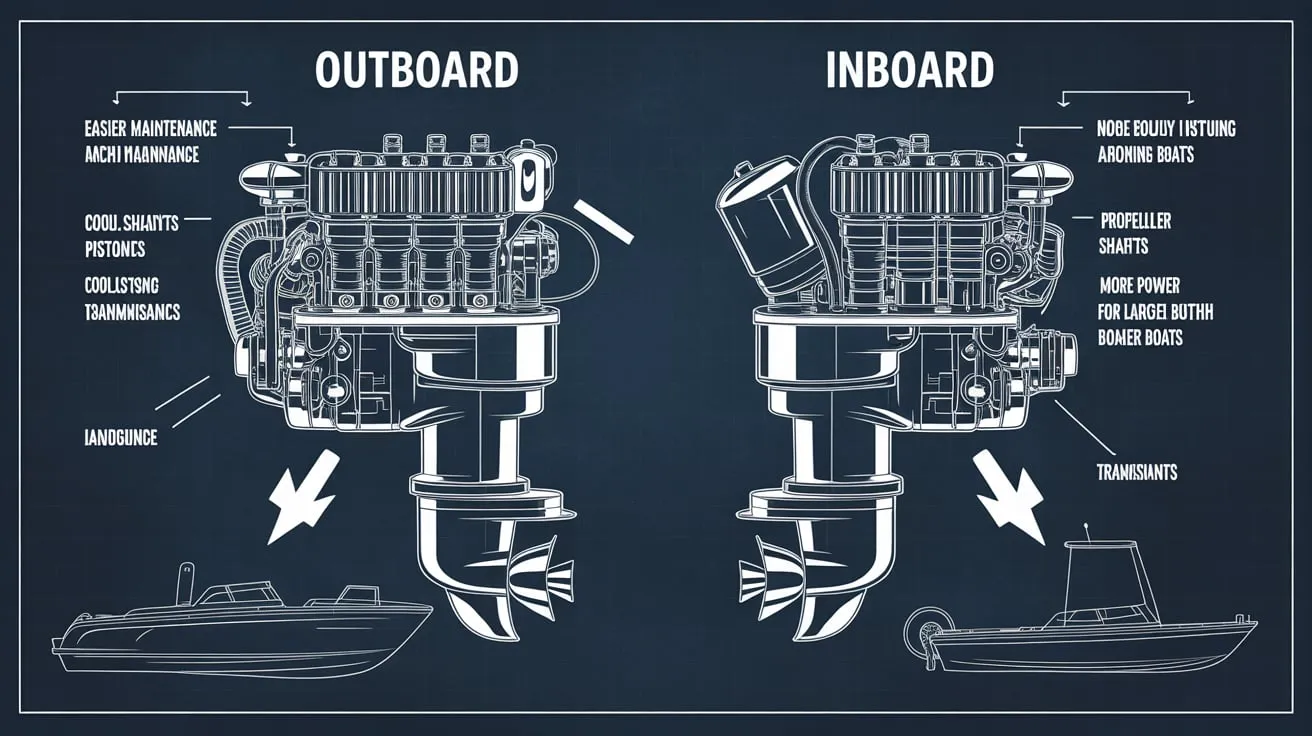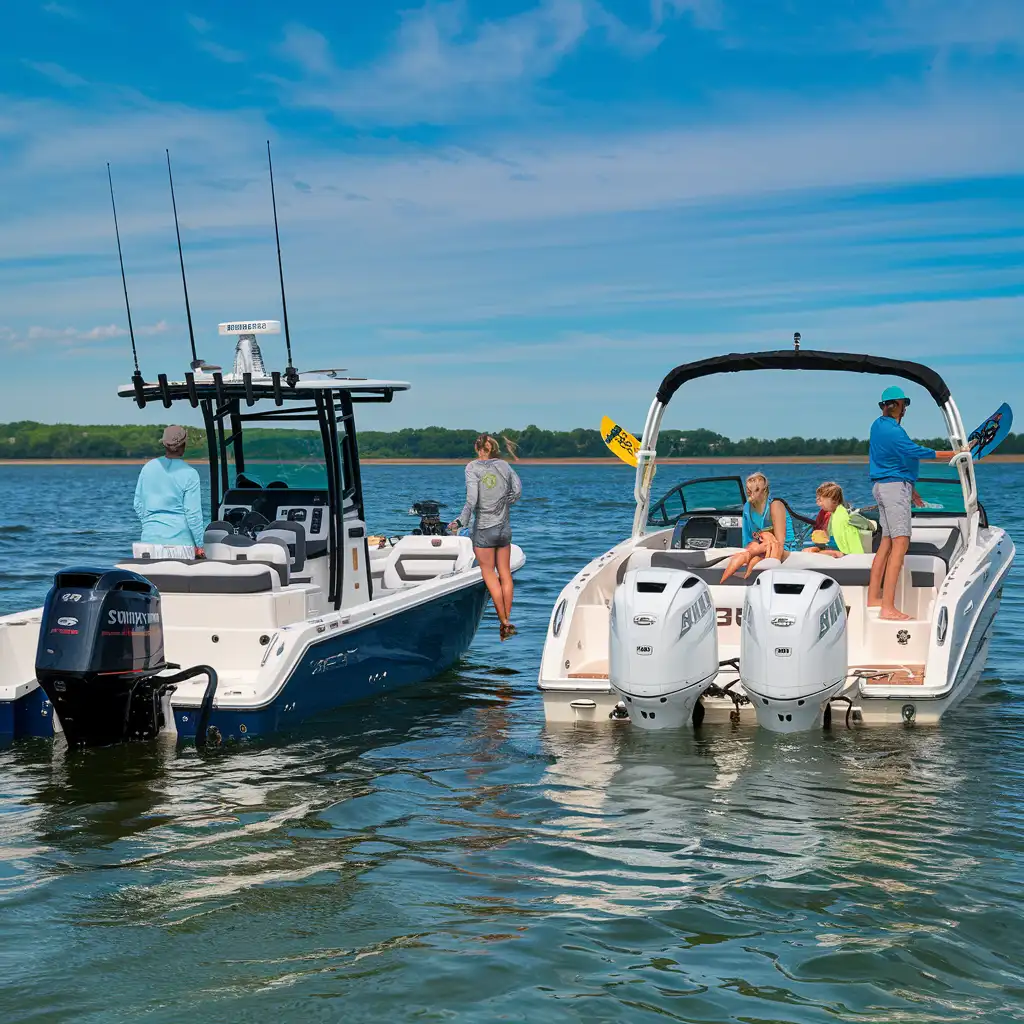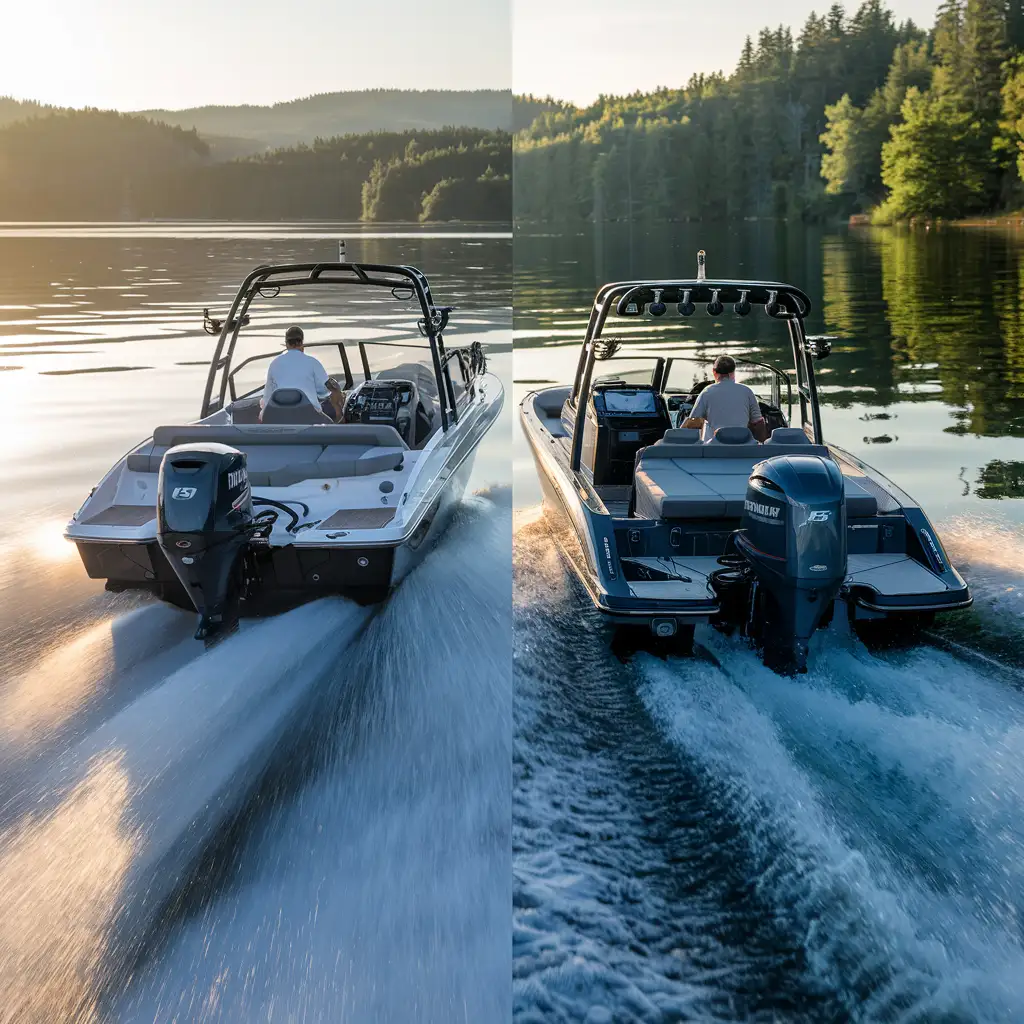Understanding Outboard vs. Inboard Engine Repairs in Miami
May 26, 2025 |
By Ali

When it comes to boat engines, understanding the differences between outboard and inboard engines is essential, especially if you’re in Miami. Each type has its own quirks and repair needs, which can affect your boating experience. Whether you’re dealing with engine troubles or just want to keep your boat in top shape, knowing the ins and outs of these engines will help you make informed decisions. This guide will walk you through everything you need to know about outboard vs. inboard engine repairs in Miami.
Key Takeaways
- Outboard engines are mounted outside the boat, while inboard engines are housed inside, affecting their maintenance and repair needs.
- Common outboard issues include overheating, fuel system failures, and electrical problems, while inboard engines often require cooling system upkeep and oil changes.
- Repair costs can vary widely based on the engine type and the specific issues, so it’s important to budget accordingly.
- Choosing a reliable repair service in Miami involves checking for certifications, experience, and customer reviews.
- Regular preventative maintenance can extend the life of any engine, helping you avoid costly repairs down the line.
Key Differences Between Outboard And Inboard Engines
Design and Placement
The most obvious difference? Where they sit on the boat. Inboard engines live inside the hull, usually near the center. Outboard engines? They clamp onto the transom at the back. This placement affects everything from how the boat handles to how easy it is to work on the engine. Think of it like this: an inboard is like a car engine under the hood, while an outboard is like a detachable power unit hanging off the back.
Performance Characteristics
Inboard engines are often linked to larger boats, known for their smooth power delivery and suitability for activities like waterskiing or wakeboarding. They usually have a lower center of gravity, which can improve stability. Outboard engines, on the other hand, are common on smaller boats and offer good power-to-weight ratio, making them quick and responsive. The horsepower of an engine greatly affects the boat’s performance. Inboard boat engines are a popular choice among boating enthusiasts due to their power, reliability, and performance.
Maintenance Requirements
Maintaining each type of engine involves different challenges. Outboard engines are generally easier to access for basic maintenance since they’re right there in the open. Inboard engines, being tucked away, can be a bit more involved to get to, but they often have more robust cooling systems. Regular maintenance is key to engine longevity.
Think about it this way: with an outboard, you can often do a quick check and even some minor repairs yourself. An inboard might require a bit more expertise and specialized tools to get the job done right. It’s all about knowing what you’re comfortable tackling and when to call in a pro.
Common Issues Faced In Outboard Engine Repairs
Outboard engines, while reliable, are prone to specific problems due to their design and exposure to the elements. Understanding these common issues can help boat owners in Miami address them promptly and prevent more extensive damage.
Overheating Problems
Overheating is a frequent issue with outboard engines. This is often caused by a blocked water intake, a faulty water pump impeller, or a malfunctioning thermostat. Saltwater corrosion can also restrict water flow, leading to overheating. Regular flushing of the cooling system is essential, especially after use in saltwater.
Fuel System Failures
Fuel-related problems are another common headache. These can range from contaminated fuel to clogged fuel filters or a failing fuel pump. Ethanol in fuel can also cause issues by attracting water and corroding fuel lines.
- Fuel contamination (water, debris)
- Clogged fuel filters
- Faulty fuel pump
Using fuel stabilizers and regularly replacing fuel filters can help prevent fuel system failures. It’s also a good idea to inspect fuel lines for cracks or leaks.
Electrical System Issues
Electrical problems can manifest in various ways, from difficulty starting the engine to intermittent power loss. Corrosion is a major culprit, affecting wiring, connections, and the battery. Regular inspection and cleaning of electrical components are crucial. Consider marine systems to keep your boat in top shape.

Understanding Inboard Engine Repair Needs
Inboard engines, while powerful and reliable, need consistent care to stay in top shape. Neglecting regular maintenance can lead to big problems down the road. Let’s look at what’s involved in keeping your inboard engine running smoothly.
Cooling System Maintenance
Overheating is a major threat to inboard engines. Regular cooling system maintenance is super important. This includes:
- Flushing the coolant lines to remove buildup.
- Checking and replacing the water pump if needed.
- Making sure the thermostat is working right.
Keeping the cooling system in good condition prevents overheating, which can cause serious engine damage. It’s a simple step that can save you a lot of money and trouble.
Oil and Filter Changes
Regular oil and filter changes are the most basic, but also the most important, part of inboard engine maintenance. Changing the oil and filter does the following:
- Reduces wear on engine parts.
- Extends the engine’s life.
- Keeps the engine running efficiently.
It’s a small investment that pays off big time in the long run. Make sure you use the right oil for your engine.
Transmission Adjustments
A misaligned transmission or propeller shaft can cause all sorts of problems. Vibrations, excess wear, and poor fuel economy are all signs that your transmission needs attention. Routine drivetrain alignment keeps everything running smoothly and prevents costly repairs. Proper alignment also improves efficiency and extends the lifespan of your drivetrain. It’s worth getting this checked regularly to avoid bigger issues later on.
Cost Considerations For Engine Repairs
Factors Influencing Repair Costs
Several things affect how much you’ll pay for engine repairs. The type of engine matters a lot. Bigger engines, especially high-performance or diesel ones, usually cost more to fix because they need specialized parts and more labor. What kind of service you need also plays a big role. A simple oil change is way cheaper than replacing a whole cooling system. How often you use your boat, and the conditions it’s in, also make a difference. Saltwater can cause corrosion, leading to more frequent repairs. Finally, the cost of parts and labor will impact the final bill. Replacing worn-out stuff like belts and gaskets adds up, but it’s better than waiting for a major breakdown. If you need mobile boat repair services in miami, keep these factors in mind.
Average Repair Prices
Here’s a rough idea of what you might expect to pay:
- Basic Annual Service: $250 – $600 (includes oil change, fuel filter replacement, and system checks).
- Full Maintenance Service: $600 – $1,200 (includes cooling system service, belt and hose replacement, and transmission check).
- Major Repairs or Overhaul: $2,000+ (this could be rebuilding parts, replacing major components, or doing full diagnostics).
Budgeting For Maintenance
Planning ahead can save you money in the long run. Regular maintenance helps catch small problems before they turn into big, expensive ones. Think of it like taking your car in for an oil change – it’s cheaper to do that than to replace the whole engine later. Also, a well-maintained engine runs better and uses less fuel, saving you even more money. It’s a good idea to set aside some money each year for boat maintenance, so you’re not caught off guard by unexpected repair bills. Here’s a tip: keep a log of all the boat engine services you’ve had done. This helps you track what’s been done and when it might need to be done again.
Choosing The Right Repair Service In Miami
Finding the right mechanic for your boat in Miami can feel like a real challenge. There are a lot of options, and not all of them are created equal. You want someone reliable, skilled, and trustworthy, especially when dealing with something as important as your boat’s engine. I’ve been there, and it took me a while to find a shop I really trust. Here’s what I learned along the way.
Evaluating Service Providers
Okay, so you’re looking for a repair service. Where do you even start? First, ask around. Talk to other boat owners at the marina or in your neighborhood. Word of mouth is often the best way to find a good mechanic. See if they offer Yamaha Outboard Parts.
Next, check out their website (if they have one). Look for details about their services, experience, and any certifications they might have. A good service provider should be transparent about their qualifications and what they can do for you. Don’t be afraid to call them up and ask questions. A reputable shop will be happy to answer your questions and explain their process.
Here’s a quick checklist:
- Ask for recommendations from other boaters.
- Check online reviews and ratings.
- Inquire about their experience with your type of engine.
Importance of Certifications
Certifications matter. A mechanic with certifications from manufacturers like Yamaha or Mercury has undergone specific training and demonstrated their knowledge of those engines. This means they’re more likely to diagnose and repair your engine correctly. Certifications show a commitment to ongoing education and staying up-to-date with the latest technologies.
It’s like going to a doctor – you want someone who’s board-certified, right? Same goes for your boat mechanic. Certifications provide an extra layer of assurance that they know what they’re doing.
Customer Reviews and Recommendations
Customer reviews are gold. Before committing to a service provider, take some time to read what other boat owners have to say about their experiences. Check out sites like Google, Yelp, and boating forums. Look for patterns in the reviews. Are people consistently praising their service, or are there recurring complaints? Pay attention to how the service provider responds to negative reviews. Do they address the concerns professionally and offer solutions? This can tell you a lot about their customer service.
Here’s what to look for in reviews:
- Consistent positive feedback about service quality.
- Comments about their communication and transparency.
- How they handle complaints and resolve issues.

Preventative Maintenance For Engine Longevity
Routine Inspections
Regular check-ups are super important. I try to do a quick look-over of my engine every time before I head out. It’s just about catching small stuff before it turns into big, expensive problems.
- Check fluid levels (oil, coolant, etc.).
- Look for any obvious leaks or damage.
- Make sure belts and hoses are in good shape.
Seasonal Maintenance Tips
Okay, so when the seasons change, your engine needs a little extra love. Think of it like changing your wardrobe – your boat engine needs to adapt too. For example, winterizing is a must if you live somewhere with freezing temperatures.
- Flush the cooling system to prevent corrosion.
- Change the oil and filter.
- Stabilize the fuel to prevent it from going bad over the winter.
Signs Your Engine Needs Attention
Sometimes, your engine will tell you something is up if you just listen. It’s like when your car makes a weird noise – you know it’s time to get it checked out. Don’t ignore these signs!
- Unusual noises (knocking, grinding, etc.).
- Decreased performance or fuel efficiency.
- Excessive smoke or overheating.
Regular maintenance is way cheaper than major repairs. Think of it as an investment in your boating fun. A little bit of work now can save you a ton of headaches (and money) later.
The Impact Of Local Conditions On Engine Performance
Saltwater Corrosion
Living in Miami, saltwater is a constant reality for boat owners. Saltwater corrosion is a major enemy to both outboard and inboard engines. Regular flushing with fresh water is a must, but even that isn’t always enough. Salt can creep into every nook and cranny, causing rust and degradation of metal parts. This is especially true for exhaust manifolds, cooling systems, and electrical connections.
Heat and Humidity Effects
The heat and humidity in Miami can really take a toll on boat engines. High temperatures can lead to overheating, especially during long runs. Humidity can also cause issues with electrical components, leading to shorts and malfunctions. It’s important to make sure your engine’s cooling system is in top shape and that all electrical connections are properly sealed. Consider using a diesel engine service to optimize performance.
Navigational Challenges
Navigating the waters around Miami presents its own set of challenges. Shallow areas, sandbars, and debris can all pose a threat to your engine’s lower unit and propeller.
Here are some common navigational challenges:
- Shallow Water: Running aground can damage your prop and lower unit.
- Debris: Floating objects can get caught in your prop, causing damage or even engine failure.
- Heavy Traffic: Increased risk of collisions and sudden maneuvers that strain the engine.
Operating your boat in these conditions requires extra caution and awareness. Regular inspections of your prop and lower unit are essential to catch any damage early.
Wrapping It Up: Outboard vs inboard engine maintenance in Miami
In the end, knowing the difference between outboard and inboard engine repairs can save you a lot of headaches and cash. Whether you’re dealing with a quick fix or a full engine replacement, understanding what each type of engine needs is key. Miami’s boat scene is vibrant, and keeping your engine in top shape means more time enjoying the water and less time worrying about breakdowns. So, if you’re unsure about what your boat needs, don’t hesitate to reach out to a pro. They can help you make the right call, ensuring your boat stays reliable for all your adventures. They are provide emergency boat engine repair service in Miami.
Frequently Asked Questions
What is the main difference between outboard and inboard engines?
Outboard engines are mounted outside the boat, while inboard engines are located inside the boat’s hull. This affects their design, performance, and maintenance needs.
What are common problems with outboard engines?
Outboard engines often face issues like overheating, fuel system failures, and electrical problems.
How do I maintain my inboard engine?
Regular maintenance for inboard engines includes checking the cooling system, changing oil and filters, and adjusting the transmission.
What factors affect the cost of engine repairs?
Repair costs can vary based on the type of engine, the extent of the damage, and the parts needed for the repair.
How can I find a reliable engine repair service in Miami?
Look for certified mechanics, check customer reviews, and ask for recommendations from other boaters.
What preventative maintenance can I do for my engine?
Routine inspections, seasonal maintenance, and being alert for signs of trouble can help keep your engine running smoothly.

Ali
Ali Hassan is a seasoned SEO content writer with over 10 years of experience in crafting high-performing content for WordPress websites. Specializing in keyword-rich blog posts, landing pages, and service descriptions, Ali blends technical SEO knowledge with engaging storytelling to drive organic traffic and improve search engine rankings.

